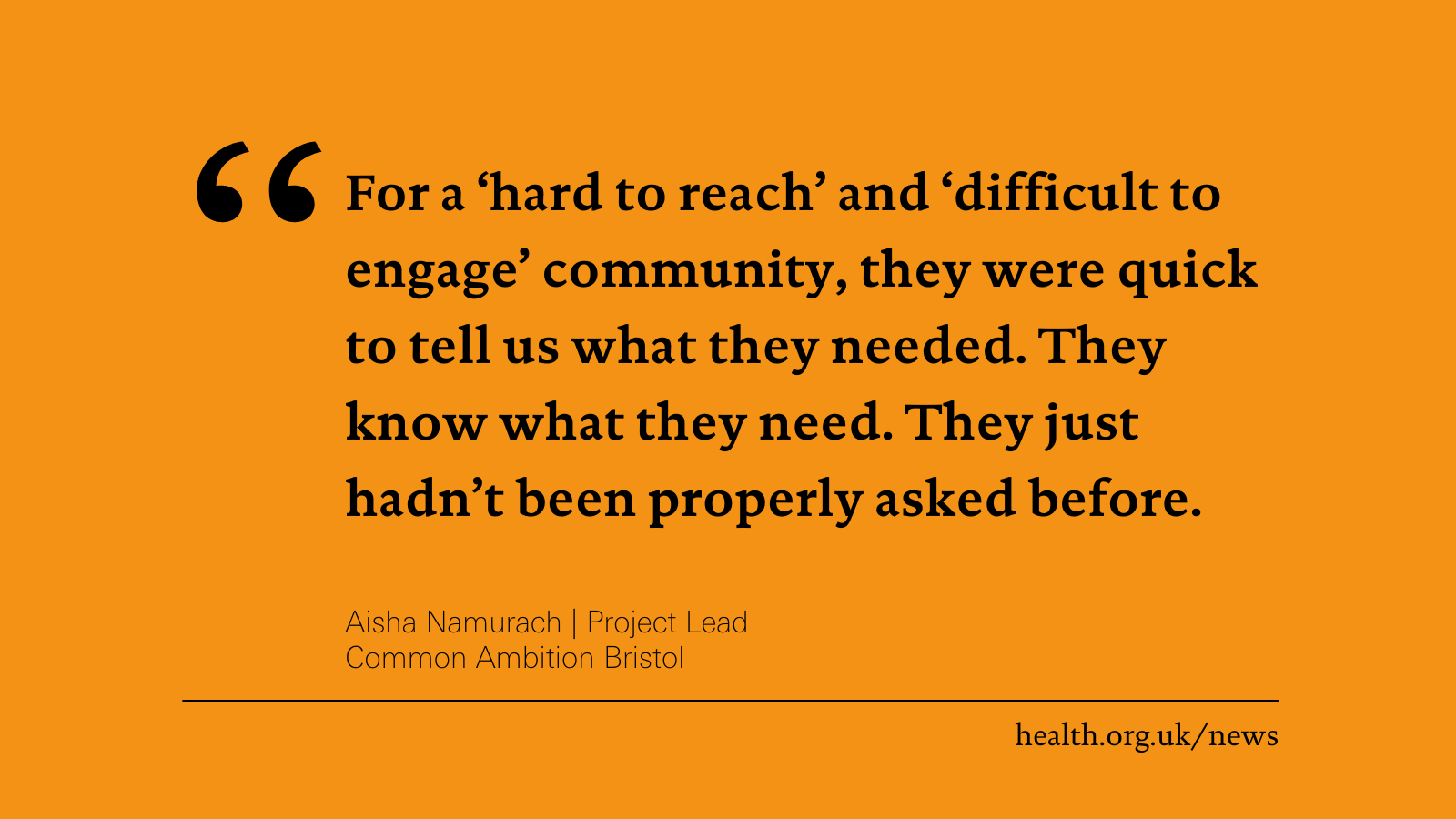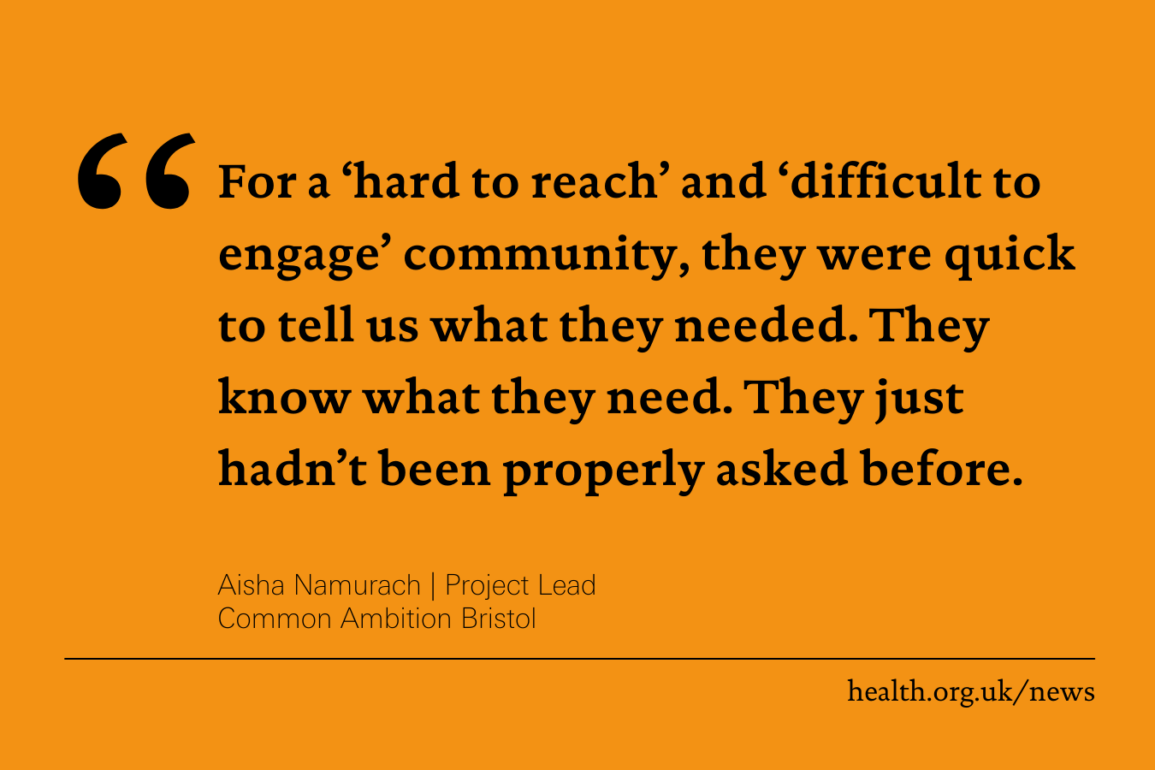
What has your project achieved since it was set up that you’re most proud of?
I’m proud of all of our work, but there are two aspects I call the jewels in our crown. One is our outreach project, which works with 35 businesses that are either black owned or well used by people from our community.
We go to them and we talk about HIV, about condoms, and about why sexual health is important in our community. We talk about where, how and when you should get tested. We have really open and often hilarious conversations in barbers, beauty shops, nail salons, supermarkets, even in the street. We’ve taken what we know to the community.
The other jewel in our crown is testing. We work with Unity, which provides sexual health services in Bristol. We told them what the community told us – that they wanted somewhere they could go and feel welcome, where the service is actually for them. We now have two specific clinics, where people come for screening and where they can access PrEP (pre-exposure prophylaxis). They are the only walk-in services dedicated specifically to African and Caribbean heritage communities in Bristol and the south west.
Why does representation matter so much when it comes to working with marginalised communities to improve health and reduce inequalities?
This work sits within bigger issues of inequalities affecting our communities. Unfortunately, we don’t live in a society yet where representation doesn’t have to matter.
It was one of the first things that was said, when we spoke to the community about what they wanted. Representation. It needs to be top down, from integrated care boards and the council, and bottom up, from people doing outreach or welcoming people into clinic. The project is driven by African and Caribbean heritage voices. They are at its heart. I affectionately call it ‘gold standard community powered co-production’.
When we started the project, we went to the community and said, this is what we’re thinking of doing, what would you like to see? They came back with 33 suggestions. For a ‘hard to reach’ and ‘difficult to engage’ community, they were quick to tell us what they needed. They know what they need. They just hadn’t been properly asked before.
What have been the wider impacts of this kind of community-led work?
We empowered the community to tell us what they needed and make decisions. We created interventions based on what we learned and we are influencing the way work is delivered, not just by us, but also in NHS and council commissioning.
If you go out to the community and ask them about Common Ambition Bristol, that conversation will show the success of what we’ve been doing. The fact that people are actually talking about sex! Those conversations about sexual health just weren’t happening before.
Bristol has great services but, by highlighting inequalities, our partners could see that marginalised communities were being let down. For instance, when we first set up a clinic, Unity didn’t have staff to lend to it who identify as part of this community. They realised they could be better at recruiting people from marginalised communities and that’s something they are changing. So we had to be honest with the community and let them know that while representation isn’t perfect, we are trying. People are welcomed by CAB staff and that is where the representation lies at present.
The project is about African and Caribbean heritage communities in Bristol. But other people have been watching, including from other parts of the country. Not only are we doing what’s needed for our community, but we’re able to influence what’s needed for marginalised communities elsewhere.
You may think your project is doing something small, but actually the impact can be massive. It’s like dropping a pebble into a still pond. The NHS is a very still pond, and we didn’t just drop a pebble, we dropped a boulder! Those ripples are starting to make change.
What did the Health Foundation as funders add to the process, and what could funders do differently to support more of this kind of work?
The Health Foundation funding was critical. It gave us security, so we could be agitative and creative in how we were doing things.
It wasn’t just about the money, it was also the support. It was about people understanding what we were trying to do and asking, how can we help you? Co-production isn’t easy, or quick, but it’s necessary. As the proverb goes – if you want to go fast go alone, if you want to go far go together. Our backing from the Health Foundation, the flexibility and understanding, has allowed us to go far.
We are lucky that our contacts within the Health Foundation are also from marginalised communities. So they understood why what we are doing is so important and the potential impact it could have.
My advice to funders is, back the underdog. Don’t always go for the people who come to you with the backing of big organisations or lots of data. When it comes to co-production work like this, there may not be the data you want to see, and things won’t always go to plan. But that doesn’t mean it’s not going to be great work. Why doesn’t that data exist? Think about and highlight conscious and unconscious bias. Don’t be afraid of being a part of the necessary change.
October is Black History Month. Can you recommend something for anyone interested in learning more about the contribution of the black community to healthcare in the UK, or to develop their understanding of health inequalities?
A book that’s just been released, called Our stories told by us, is about African women’s contribution to the HIV response in the UK. Black women’s voices are often silenced but what this book tells you is these women are loud, active activists. They are implementing changes that benefit not just black communities, but all communities affected by HIV.
I’d recommend Divided by Annabelle Sowemimo. It highlights racial bias in medicine across the board and it’s a really important read.
And for anybody who wants an insight into why Black History Month is important in the UK, read Natives by Akala. It’s a young black man’s perspective on race and the leftover unconscious and conscious bias from being part of an empire.
My final thought to share would be that Black History Month is a chance for highlighting past, present and future issues and triumphs of our community. But remember that for the visibly marginalised, inequality and inequity is an everyday, all-day issue.
Many of the people involved with work like this who don’t have lived experience of marginalisation will get to walk away from the issues at the end of the project. Common Ambition Bristol will hopefully have shown us all that walking away like that is not an option for everyone. Many people get involved in community work because they want to make a difference. If you are involved in work with marginalised communities then please take the time to think if what you’re doing is contributing to long lasting, authentic and effective change. If it isn’t, then do what you need to do to make sure that it does.
This content originally featured in our email newsletter, which explores perspectives and expert opinion on a different health or health care topic each month.



